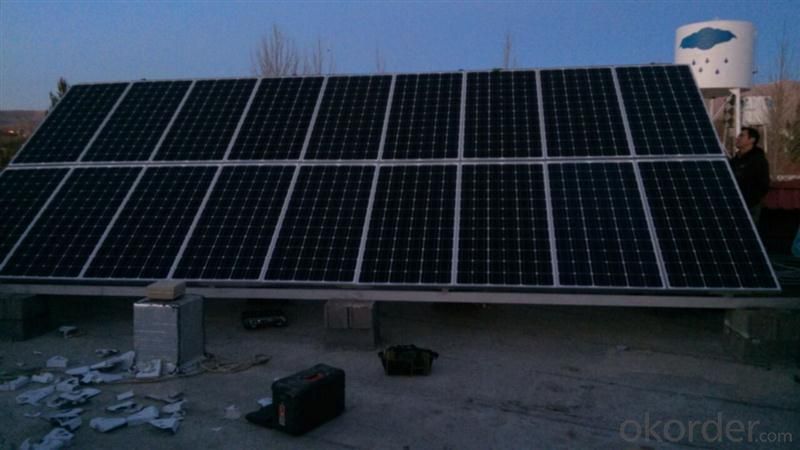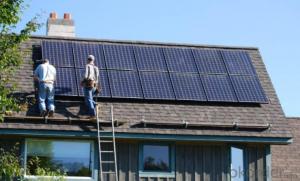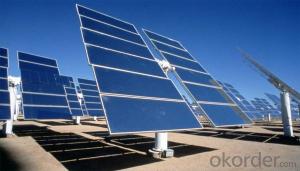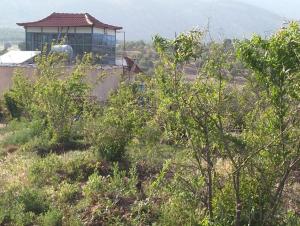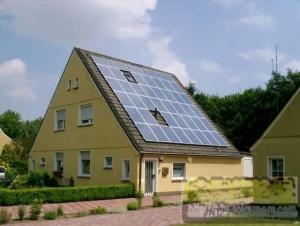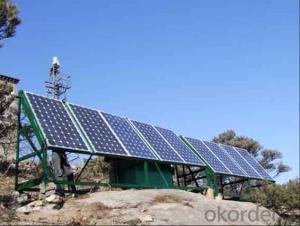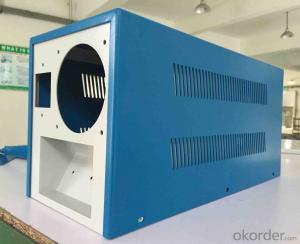Off-Grid Solar Power System 1.5KW High Efficiency
- Loading Port:
- China main port
- Payment Terms:
- TT OR LC
- Min Order Qty:
- 1 pc
- Supply Capability:
- 10000 pc/month
OKorder Service Pledge
OKorder Financial Service
You Might Also Like
1.Description of Product
Off-Grid Solar Power System is consisted of solar panel, solar charge controller, inverter, battery, mounting rack and cables.
(1).Grid-connected, send power to city grid
(2).MPPT technology, wide range of working voltage
(3).Simply Wiring, easy installation, customized design for your projects
(4).Low investment & long term feedback
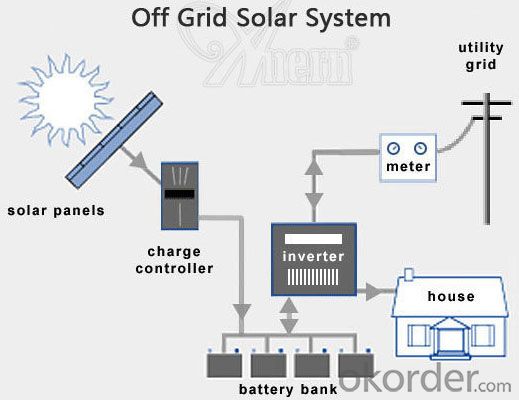
2. Off-Grid Features
1. Off grid solar power system is mainly used for application with relatively-small power consumption, and the areas have no grid network coverage, or grid power is unstable or outage condition.
2. It’s composed of solar panels, hybrid solar inverter, battery bank, solar panel mounting racks, and other accessories required fora complete home solar power system.
3. The battery bank gives a stable power output to the solar inverter which converts DC to AC to power loads, and provides power backup in rainy or cloudy days.
4. The solar panels generate electricity at daytime and charge the battery bank .
5. The off grid home solar power system provides grid power bypass in case of battery power shortage when sunshine is not enough.
6. All the off grid home solar power system configurations are worked out by scientific calculation and design.
The Product Parameter | |
Ref No. | 1.5KW |
Solar Panel | Type: Monocrystalline Silicon PV Module Max Power: 250W QTY:4 pcs |
Controller-Inverter Integrator | Rated Ouput Power: 1500W Rated DC Voltage: 48V QTY:1 pcs |
Battery | 12V/200AH per piece QTY:4 pcs |
Solar Panel Rack | Roof type mounting rack, anodized aluminum material, including complete fittings (Other type of racks can be customized as per client's requirement) QTY:1 pcs |
Cables | International standard, with specification suitable for solar system, RVV2*6 QTY:30m |
3.The Pictures of Product
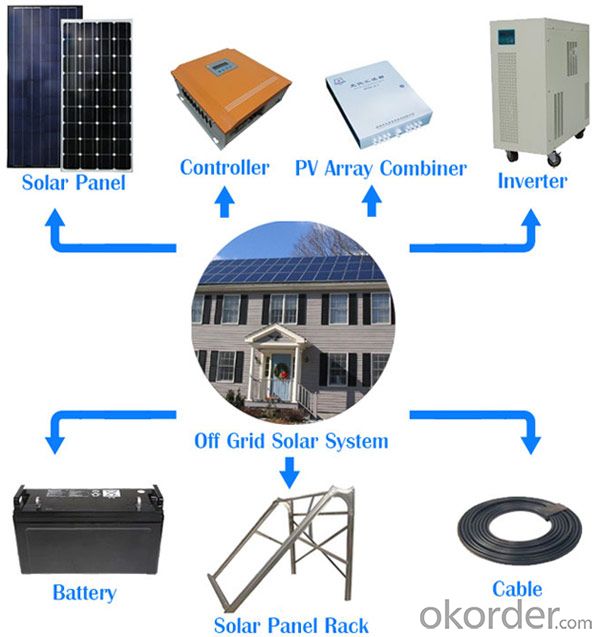
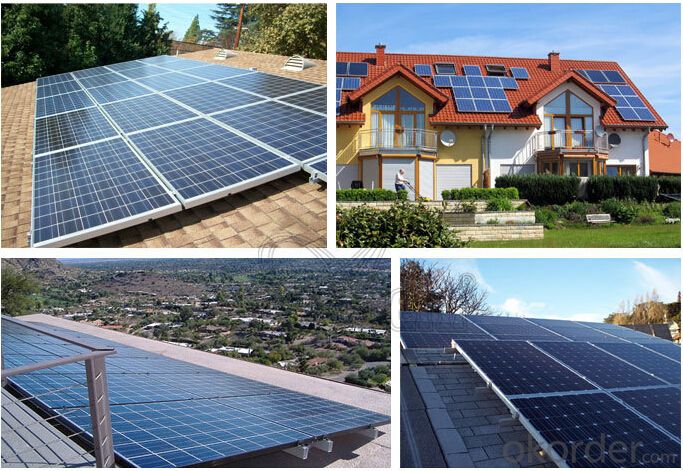
4.FAQ
Q1: What is the business type for the company?
A1: We are one of the biggest manufacturers inBejing.Chnia. Which is a high tech PV enterprise dedicated to the research, development, production and sales..
Q2: How long solar panel warranty can you offer?
A2: 10-Year product warranty,25-year linear power output warranty
If there is any quality problem, we will pay for freight and send free parts to you.
Q3: How many certificates do you have?
A3: We have 16 certificates,such as CE, TUV, UL, and so on.
Q4: Can I be the agent for you?
A4: Yes,We can discuss some information.
Q5: How to get a sample?How can cooperation with us
A5: contact us now.
- Q: Is it possible to store excess electricity generated by a solar energy system?
- Yes, it is possible to store excess electricity generated by a solar energy system. This can be achieved through the use of batteries or other energy storage systems.
- Q: Can a solar energy system be installed on commercial buildings?
- Yes, a solar energy system can be installed on commercial buildings. In fact, many commercial buildings have already embraced solar energy as a viable and sustainable way to generate electricity. Commercial buildings provide ample rooftop space or open land areas that can be used to install solar panels. These panels can be integrated into the building's design or mounted on the rooftop, allowing them to capture sunlight and convert it into electricity. Installing a solar energy system on a commercial building offers several benefits. Firstly, it can help reduce energy costs significantly, as solar energy is a renewable and free source of power. Secondly, it can provide a clean and environmentally friendly alternative to traditional energy sources, reducing the building's carbon footprint. Additionally, commercial buildings with solar panels can benefit from various government incentives and tax credits that promote the use of renewable energy. Overall, the installation of a solar energy system on commercial buildings is not only feasible but also financially and environmentally advantageous.
- Q: Do solar energy systems require regular inspections?
- Yes, solar energy systems do require regular inspections to ensure their proper functioning and efficiency. Regular inspections help identify any potential issues, such as damage, malfunctioning components, or reduced energy production, which can be addressed and resolved promptly to maintain the system's performance and longevity.
- Q: How does a solar panel convert sunlight into electricity?
- A solar panel converts sunlight into electricity through the photovoltaic effect. When sunlight hits the solar panel, it excites the electrons in the semiconductor material, creating a flow of electric current. This current is then collected and used as electricity.
- Q: Can solar energy systems be used in disaster-prone areas?
- Yes, solar energy systems can be used in disaster-prone areas. In fact, they can be particularly beneficial in such areas. Traditional power grids are often fragile and vulnerable to damage during natural disasters such as hurricanes, earthquakes, or floods. This can leave the affected areas without electricity for extended periods, hindering relief and recovery efforts. Solar energy systems, on the other hand, are decentralized and can operate independently of the grid. These systems consist of solar panels that convert sunlight into electricity, which can be stored in batteries for use during times of power outage. This allows critical facilities, such as hospitals, emergency response centers, and shelters, to continue functioning even when the grid is down. Solar energy systems can provide a reliable source of power for lighting, communication, refrigeration, and medical equipment, greatly enhancing the resilience and effectiveness of disaster response. Furthermore, solar energy systems can also be used to power water pumps, providing communities with access to clean water during times of crisis. This is particularly important in disaster-prone areas, where access to safe drinking water can be severely compromised. Solar-powered pumps can extract water from wells, rivers, or other sources, ensuring a constant supply for drinking, sanitation, and hygiene purposes. Additionally, solar energy systems can contribute to long-term recovery efforts in disaster-prone areas. By reducing dependence on fossil fuels and traditional power grids, they can help build more sustainable and resilient communities. Solar panels can be installed on rooftops or in open spaces, making use of abundant sunlight resources. This not only reduces greenhouse gas emissions and mitigates climate change but also provides a reliable and affordable source of energy for homes, businesses, and public infrastructure. In conclusion, solar energy systems can be effectively used in disaster-prone areas to provide reliable power, support critical services, and contribute to long-term resilience. By harnessing the power of the sun, these systems offer a sustainable and decentralized solution to energy needs, ensuring that communities can withstand and recover from natural disasters more effectively.
- Q: Can solar energy systems be used in areas with limited access to solar energy maintenance services?
- Yes, solar energy systems can still be used in areas with limited access to solar energy maintenance services. While regular maintenance and servicing are important for optimal performance and longevity of solar energy systems, advancements in technology have made them more durable and self-sufficient. Additionally, training programs and remote monitoring services are available to help individuals in such areas troubleshoot and maintain their systems effectively. With proper education and support, communities with limited access to maintenance services can still benefit from solar energy.
- Q: How do solar batteries store excess energy?
- Solar batteries store excess energy by converting the surplus electricity generated by solar panels into chemical energy. This is done through a process called charging, where the excess energy is used to charge the battery. The battery then stores this energy as chemical potential energy, which can be later converted back into electrical energy when needed.
- Q: Can a solar energy system be installed in an area with a high earthquake risk?
- Yes, a solar energy system can be installed in an area with a high earthquake risk. However, specific design considerations and engineering expertise are required to ensure the system can withstand seismic activity. Implementing advanced mounting systems, utilizing flexible wiring, and reinforcing structural supports are some of the measures taken to enhance the system's resilience against earthquakes.
- Q: Can a solar energy system be installed on a parking garage or structure?
- Yes, a solar energy system can be installed on a parking garage or structure. In fact, parking garages and structures are often ideal locations for solar panel installations due to their large, open areas and unobstructed access to sunlight. Installing solar panels on parking structures not only helps to generate clean and renewable energy, but it can also provide shading for parked vehicles, reducing the heat island effect and improving energy efficiency.
- Q: Are there any limitations to the amount of electricity a solar energy system can generate?
- Yes, there are limitations to the amount of electricity a solar energy system can generate. The primary limitation is the availability of sunlight. Solar panels require direct sunlight to generate electricity, so factors such as weather conditions, geographical location, and time of day can affect the amount of sunlight received. Cloudy or rainy days can significantly reduce the electricity output of a solar energy system. Another limitation is the physical space available for installing solar panels. The size and number of panels that can be installed depend on the available roof or ground space. Limited space can restrict the overall capacity of the system and, consequently, the amount of electricity it can generate. Additionally, the efficiency of solar panels is a determining factor. The efficiency of converting sunlight into electricity varies depending on the type and quality of solar panels used. Higher efficiency panels can generate more electricity than lower efficiency ones. Furthermore, solar energy systems are also subject to degradation over time. Solar panels experience a gradual decrease in efficiency as they age due to factors like exposure to sunlight, temperature fluctuations, and environmental conditions. This degradation can reduce the overall electricity generation capacity of the system. Finally, energy storage is a limitation. Solar energy systems generate electricity during the day, but the demand for electricity often remains constant throughout the day and night. Without an efficient energy storage system, excess electricity generated during the day is wasted if not used immediately. Therefore, the inability to store excess electricity limits the overall amount that can be generated by a solar energy system. In summary, while solar energy systems offer a sustainable and renewable source of electricity, there are limitations to the amount they can generate due to factors such as sunlight availability, physical space, panel efficiency, system degradation, and energy storage capabilities.
Send your message to us
Off-Grid Solar Power System 1.5KW High Efficiency
- Loading Port:
- China main port
- Payment Terms:
- TT OR LC
- Min Order Qty:
- 1 pc
- Supply Capability:
- 10000 pc/month
OKorder Service Pledge
OKorder Financial Service
Similar products
Hot products
Hot Searches
Related keywords



